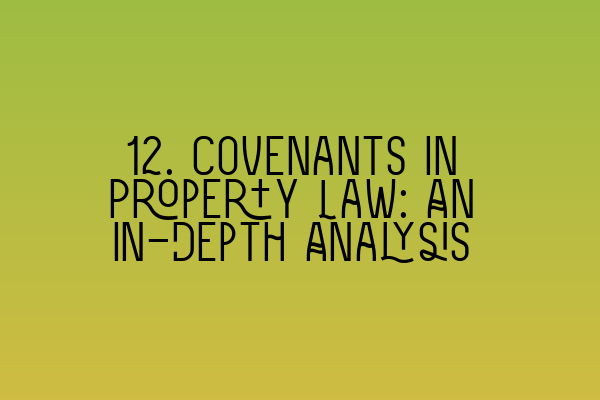12. Covenants in Property Law: An In-Depth Analysis
Property law is a complex and multifaceted area, and one of the key concepts within it is the idea of covenants. Covenants are legal obligations or promises that are attached to the ownership of a property. They can have a significant impact on the use and enjoyment of the property, as well as on the rights and obligations of the parties involved.
In this in-depth analysis, we will explore the different types of covenants in property law, their purpose, and the legal implications they carry. It is important for property law practitioners, as well as those studying for the SQE exams, to have a comprehensive understanding of covenants as they frequently arise in real estate transactions and disputes.
1. What is a Covenant?
A covenant is a legally binding agreement between parties, typically relating to the use or condition of a property. They can be positive covenants, which require the party to do something, or negative covenants, which restrict certain actions. Covenants are usually written agreements, but they can also be implied in certain circumstances.
Covenants often arise in the context of land transactions, such as the sale or lease of a property. They are intended to regulate the behavior of the parties involved and ensure that the property is used and maintained in a specific manner.
2. Types of Covenants
There are various types of covenants in property law, each serving a different purpose and imposing different obligations on the parties. Let’s explore the most common types:
a. Restrictive Covenants
Restrictive covenants are negative covenants that impose limitations on the use or development of a property. They are often included in deeds to protect the character or value of a neighborhood. For example, a restrictive covenant may prohibit the construction of certain types of buildings or the use of a property for specific purposes.
Restrictive covenants can be enforceable by the original parties to the covenant, as well as by subsequent owners of the affected properties. They are typically enforced through injunctive relief, which means a court may order the party in breach of the covenant to stop the prohibited activity or rectify the breach.
b. Positive Covenants
Positive covenants, on the other hand, require a party to perform certain actions or obligations. These covenants may include maintaining the property in a particular state, contributing to the maintenance of communal areas, or granting access rights to others. Positive covenants are often found in leases, where the tenant agrees to perform specific obligations during the term of the lease.
Unlike restrictive covenants, positive covenants are generally not enforceable by subsequent owners of the affected properties unless there has been an express assignment of the covenant.
c. Mutual Covenants
Mutual covenants are covenants that both parties to an agreement undertake to perform. They are often found in contracts for the sale of land, where both the buyer and the seller agree to certain obligations. For example, the seller may covenant to provide clear title to the property, while the buyer may covenant to pay the purchase price on completion.
d. Leasehold Covenants
Leasehold covenants are specific to lease agreements and govern the relationship between the landlord and the tenant. These covenants may include obligations related to rent payment, property maintenance, or even the use of the property. Breach of leasehold covenants can result in the termination of the lease or other remedies available to the parties.
3. Enforceability of Covenants
The enforceability of covenants depends on various factors, including their nature, the intent of the parties, and the legal requirements of the jurisdiction. In general, for a covenant to be enforceable, there must be an intention to create legal relations, the covenant must be sufficiently certain, and it must touch and concern the land.
Additionally, covenants may be subject to time limitations. Some covenants may have specific durations or may terminate upon the happening of certain events. It is essential to carefully review the terms of each covenant to determine its enforceability and duration.
4. Breach of Covenants
When a party fails to comply with the obligations set out in a covenant, it constitutes a breach. The consequences of a breach of covenant can vary depending on the nature of the covenant, the extent of the breach, and the available remedies under the law.
For example, in the case of a breach of a restrictive covenant, an injunction may be sought to prevent further breaches and enforce compliance. In the case of a breach of a positive covenant, the injured party may seek damages as compensation for the harm suffered as a result of the breach.
5. Conclusion
Covenants play a crucial role in property law, shaping the rights and obligations of property owners and occupants. Understanding the different types of covenants and their legal implications is vital for both property law practitioners and individuals involved in real estate transactions.
If you are preparing for the SQE exams, it is important to have a solid understanding of covenants in property law. We offer comprehensive SQE 1 and SQE 2 preparation courses to help you succeed. Additionally, don’t forget to check out our SQE 1 practice exam questions and practice mocks FLK1 FLK2 to enhance your study experience.
For more information on the SQE exams and important dates, be sure to visit our SRA SQE Exam Dates page.
Remember, at SQE Property Law & Land Law, we are here to support your legal journey and help you achieve your professional goals.
If you have any questions or would like further information on covenants or any other property law topics, please don’t hesitate to contact us.
